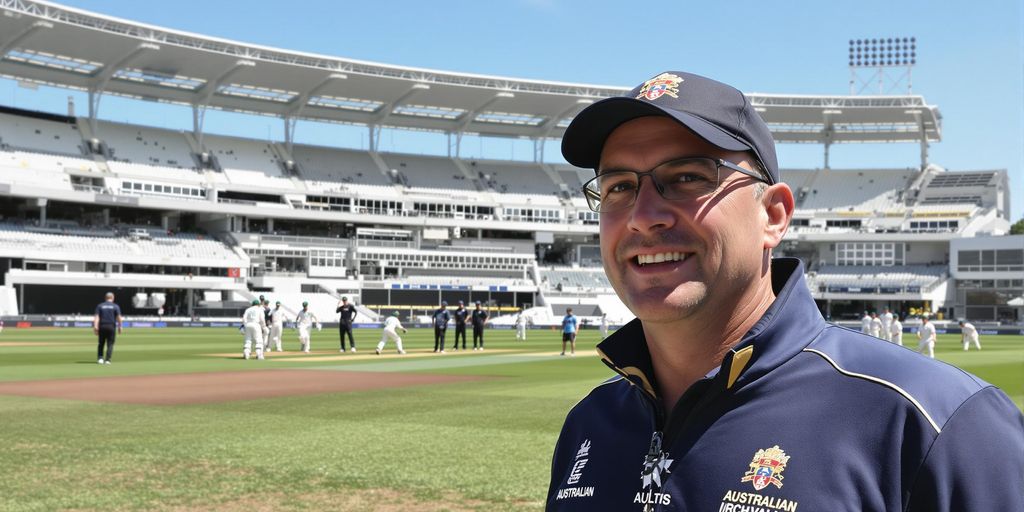Current Coaching Landscape
Overview Of Andrew McDonald’s Tenure
Andrew McDonald took the reins as the head coach of the Australian cricket team, and it’s fair to say his time has been a bit of a mixed bag. He stepped into some pretty big shoes, and the expectations were sky-high. Cricket Australia locked him in until the end of 2027, showing they have faith in his long-term vision.
Achievements Under McDonald
McDonald has certainly had some notable wins. The biggest feather in his cap is probably the ODI World Cup victory. He’s also overseen some successful Test series at home. Under his guidance, we’ve seen some players really step up and perform consistently, which is always a good sign. The team secured the World Test Championship final in 2023, although they beat India in the final.
Criticism And Challenges Faced
It hasn’t all been smooth sailing, though. There’s been some criticism, particularly around the team’s performance in the T20 format. The T20 World Cup results were disappointing, and some people are questioning the team’s approach to the shorter form of the game. There’s also the challenge of managing player workloads and ensuring the squad stays fresh and motivated across all formats.
Balancing the demands of international cricket with the need to develop new talent is a constant challenge. McDonald has to juggle these competing priorities while also dealing with the intense scrutiny that comes with the job.
Calls For Change In Coaching

There’s been a fair bit of chatter lately about whether it’s time for a change in the coaching setup for the Australian cricket team. After a few up-and-down performances, some folks are starting to wonder if a fresh perspective might be just what the team needs to get back to its dominant best. It’s a tough gig, no doubt, but the pressure is always on to deliver results.
Mark Waugh’s Perspective
Mark Waugh, a legend of the game, has been pretty vocal about his thoughts. He reckons the team needs a bit of a ‘reboot’, suggesting that a new voice and approach could inject some much-needed energy and ideas into the squad. Waugh’s comments have definitely stirred the pot and got people thinking about the direction the team is heading.
Need For A Fresh Approach
Sometimes, things can get a bit stale, even with the best coaching staff. A fresh approach might involve:
- New training techniques to keep the players sharp.
- Different strategies for approaching matches.
- A focus on developing new talent and giving them opportunities.
It’s not necessarily about saying the current setup is bad, but more about exploring whether a different perspective could unlock new potential within the team. A new coach might bring a different philosophy or be able to connect with the players in a way that sparks improved performance.
Debate Over Dual Coaches
The idea of having dual coaches – one for Test cricket and another for limited-overs formats – has been floated around. The argument is that it allows for specialised attention and expertise in each format, given how different the demands are. Here’s a quick look at how some other nations are handling their coaching duties:
| Nation | Coach(es) |
|---|---|
| India | Rahul Dravid (previously all formats) |
| Afghanistan | Jonathan Trott (all formats) |
| South Africa | Rob Walter (white ball), Shukri Conrad (Tests) |
This approach could allow for a more tailored strategy, like focusing on team dynamics for specific formats, but it also raises questions about coordination and potential conflicts in vision.
Potential Candidates For The Role

With Andrew McDonald’s tenure under scrutiny, the rumour mill is spinning about who might be next in line to coach the Australian cricket team. It’s a high-pressure gig, and finding the right person is absolutely vital for our continued success on the world stage.
Domestic Coaches In The Frame
There’s always a strong push for homegrown talent, and a few names keep popping up. Guys like Jason Gillespie, who’s had success in county cricket, are often mentioned. Then you’ve got the current state coaches – they know the Aussie system inside and out, and have worked closely with many of the players. It’s a big step up to the national level, but some of them definitely have the credentials. It’s worth keeping an eye on coaches from Western Australia, Queensland, and New South Wales. The list of potential candidates is quite extensive.
International Coaching Talent
Sometimes, a fresh perspective is what’s needed, and that means looking overseas. Names like Stephen Fleming, who’s done wonders with Chennai in the IPL, are often thrown around. The challenge is always adapting to the Australian cricket culture, which is unique. But the right international coach could bring new ideas and strategies to the table.
Former Players As Coaches
This is always a popular option with the fans. Guys like Ricky Ponting or Michael Clarke – legends of the game – have the respect of the players and a deep understanding of what it takes to win. The big question is whether they’re willing to commit to the demanding schedule and responsibilities of the job. It’s a different beast to playing, but their experience could be invaluable.
It’s a tough decision for Cricket Australia. They need someone who can handle the pressure, develop young talent, and keep us competitive against the best in the world. The next appointment could shape the future of Australian cricket for years to come.
Here are some key considerations for potential coaches:
- Experience in high-pressure environments
- Proven ability to develop young players
- Strong communication and leadership skills
Impact Of Recent Performances
T20 World Cup Disappointments
Let’s be honest, the recent T20 World Cup showings haven’t been up to scratch. We went in with high hopes, but the boys just couldn’t seem to string enough wins together. The inability to adapt to different conditions and execute under pressure was a real killer. It’s a tough format, T20, but we expect more from our national team. The inconsistency is a worry, especially with another tournament just around the corner.
Test Series Results
Test cricket is where reputations are made, and lately, we’ve seen a mixed bag. Some dominant series wins at home, but struggles overseas, particularly on spinning wickets. The batting lineup has looked shaky at times, and the bowlers haven’t always been able to deliver the goods when it matters most. It’s a concern, and something needs to change if we want to stay at the top.
ODI World Cup Success
Thank goodness for the ODI World Cup! That was a massive win and a real shot in the arm for Australian cricket. The team played with grit and determination, and it was great to see them lift the trophy. It showed that we still have the talent and the ability to compete at the highest level. Hopefully, that success can be a springboard for future achievements.
Winning the ODI World Cup bought the team and the coach some breathing room, no doubt. But you can’t rest on your laurels in this game. The other formats are just as important, and we need to see improvements across the board.
The Role Of State Coaches
Influence On National Selection
State coaches play a significant role in shaping the national team. They’re the ones working closely with players week in and week out, seeing their form and development firsthand. Their insights are invaluable when it comes to national selection. It’s not just about raw talent; it’s about temperament, work ethic, and how a player fits into a team dynamic. The national selectors rely on this feedback to make informed decisions, especially when choosing between players with similar skill sets.
Development Of Young Talent
State coaches are at the coalface of developing young cricketers. They’re responsible for:
- Identifying promising players early on.
- Providing them with the necessary coaching and resources.
- Mentoring them through the challenges of professional cricket.
- Creating a pathway for them to progress through the ranks.
State coaches are the unsung heroes of Australian cricket. They dedicate countless hours to nurturing young talent, often with little recognition. Their work is essential for ensuring a steady stream of quality players for the national team.
Collaboration With National Team
It’s important that state coaches and the national team management work together. There needs to be open communication and a shared understanding of the national team’s goals and strategies. This collaboration can take many forms, including:
- Regular meetings and phone calls.
- Sharing data and insights on players.
- Involving state coaches in national team training camps.
- Ensuring that young players are being developed in a way that aligns with the national team’s needs.
This collaborative approach helps to ensure a smooth transition for players moving between state and national teams. It also allows the national team to tap into the expertise of state coaches, who have a deep understanding of the local cricket landscape. It’s all about creating a unified system where everyone is working towards the same goal: success for Australian cricket. You can find coaching positions in Melbourne and Victoria.
Future Challenges Ahead
Upcoming Tours And Series
The Aussie cricket team’s got a jam-packed schedule coming up, mate. We’re talking about some seriously tough tours and series that’ll test the boys’ metal. From battling it out in the subcontinent’s spinning wickets to facing the Poms in another Ashes showdown, there’s no shortage of challenges on the horizon. How the team manages their workload and adapts to different conditions will be absolutely critical.
Transitioning The Team
Let’s be honest, some of our legends aren’t getting any younger. We’re facing a generational shift, and it’s crucial we handle it right. Finding the next generation of players who can step up and fill those big shoes is no easy task. It’s about more than just finding blokes who can bat and bowl; it’s about finding players with the right attitude and Aussie grit.
Balancing Experience And Youth
Finding the right mix of seasoned veterans and fresh faces is a delicate balancing act. You need the experience to guide the team through tough situations, but you also need the energy and enthusiasm of youth to keep things moving forward. It’s about creating a team where everyone can learn from each other and contribute to a winning culture.
It’s a bit like making a good cuppa – you need the right blend of ingredients to get the perfect taste. Too much of one thing, and it throws the whole thing off. The coaching staff needs to be spot-on with their selections and development plans to ensure we stay competitive.
The Importance Of Coaching Philosophy
Continuity Vs. Change
Finding the right balance between sticking with what works and embracing new ideas is a tough gig. You don’t want to throw out the baby with the bathwater, but you also can’t afford to be stuck in the past. A good coach knows when to tweak things and when to make wholesale changes. It’s about understanding the team’s strengths and weaknesses and adapting accordingly. The legacy of the former Australian cricket coach is celebrated through reflections on his impactful tenure.
Adapting To Different Formats
Cricket isn’t just cricket anymore. We’ve got Tests, ODIs, T20s – each with its own set of demands. A coach needs to be across all of them, understanding the nuances of each format and tailoring the approach accordingly. What works in a Test match might be a disaster in a T20, and vice versa. It’s about having a flexible game plan and the ability to adjust on the fly.
Building A Winning Culture
It’s not just about the tactics; it’s about creating an environment where players can thrive. A winning culture is built on trust, respect, and a shared sense of purpose. It’s about fostering leadership within the team and empowering players to take ownership. It’s also about setting high standards and holding everyone accountable.
A strong coaching philosophy is the bedrock of any successful cricket team. It provides a framework for decision-making, guides player development, and shapes the overall identity of the team. Without a clear philosophy, a team can easily drift and lose its way.
Here are some key elements of a winning culture:
- Clear communication
- Mutual respect
- Shared goals
Fan And Media Expectations
Public Sentiment On Coaching Changes
Look, Aussie cricket fans are a passionate bunch, right? They’re not shy about voicing their opinions, especially when things aren’t going to plan. After a few recent hiccups, you can bet there’s a fair bit of chatter down at the pub and on social media about who should be calling the shots. The general feeling is that while we appreciate stability, results are king. If the team isn’t performing, the pressure ramps up real quick. It’s all about finding that balance between sticking with a coach and knowing when it’s time for a change.
Media Analysis Of Performance
The media, they’re always on the lookout for a good story, aren’t they? They dissect every single performance, every selection decision, and every tactical move. They’ll be all over the Australian cricket commentators, offering their two cents on what’s working and what isn’t. It’s a constant barrage of opinions, stats, and predictions. They can really influence the public’s perception of the coach and the team.
Expectations For Upcoming Series
With the upcoming tours and series, the pressure is definitely on. Fans and the media alike have high expectations. We want to see the team dominating, playing with that classic Aussie grit and determination. Anything less, and the heat will be turned up.
The expectation is always to win, plain and simple. We’re not just talking about winning; we’re talking about winning convincingly and playing the kind of cricket that makes us proud. It’s a tough ask, but that’s the standard we hold ourselves to.
Here’s a quick look at what’s expected:
- Winning the Ashes, obviously.
- Dominating in the ODI format.
- Developing young talent for the future.
Long-Term Vision For Australian Cricket
Strategic Planning For 2027
Looking ahead to 2027, Cricket Australia is already putting plans in place. Andrew McDonald’s contract extension signals a commitment to stability as we approach a crucial period. The focus is on future-proofing the team, ensuring a smooth transition as senior players move on. This involves careful management of playing opportunities, especially in white-ball cricket, to give the next generation exposure. It’s about getting the balance right between experience and new talent. commercial growth is key to supporting these long-term plans.
Nurturing Future Stars
Identifying and developing young talent is paramount. This means not only spotting potential at the state level but also providing opportunities for them to shine on the international stage.
Key steps include:
- Investing in youth programmes at the grassroots level.
- Providing pathways for state players to progress to the national team.
- Offering exposure in white-ball formats to build confidence.
It’s about creating an environment where young players can learn from experienced heads, gradually taking on more responsibility as they develop. This approach ensures a constant stream of talent ready to step up when needed.
Maintaining Competitive Edge
Staying ahead of the game requires constant adaptation and innovation. The international cricket landscape is ever-changing, and Australia needs to be proactive in identifying new trends and strategies. This includes:
- Analysing opposition strengths and weaknesses.
- Adapting coaching methods to suit different formats.
- Embracing new technologies to improve player performance.
Ultimately, the goal is to ensure that Australia remains a dominant force in world cricket for years to come. The upcoming Future Tours Programme will be a test, but with careful planning and a focus on developing talent, we can maintain our competitive edge.
Looking Ahead: The Next Steps for Australian Cricket
As we look to the future of Australian cricket, the question of who will take the reins as coach remains a hot topic. Andrew McDonald has had his successes, but the recent T20 World Cup performances have raised eyebrows. With calls for a fresh approach, especially in the shorter formats, it’s clear that change might be on the horizon. The selectors have a tough job ahead, balancing the need for new talent with the experience of seasoned players. Whatever happens, one thing’s for sure: the next coach will have a significant role in shaping the future of this proud cricketing nation.




